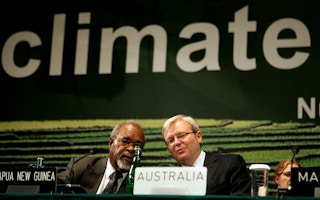After almost two years of policy planning, government consultation, independent reports, drafting and redrafting of legislation, and furious industry lobbying, the stage is set for what could be an historic week in Australian politics.
Prime Minister Kevin Rudd’s Carbon Pollution Reduction Scheme will head to the Australian Senate this week to be voted on for the second time following a series of concessions and amendments designed to make the scheme more palatable for the conservative Opposition, whose votes are crucial to pass the bill.
Mr Rudd and his Climate Change Minister Penny Wong’s plan to reduce emissions by up to 25 per cent by 2020 (dependent on the rest of the world signing up to post-Kyoto targets) hangs in the balance with a vote likely to come before the upper house on Thursday.
Australia’s former resources minister under the Howard government, Ian Macfarlane, has assumed one of the key negotiating roles to thrash out a proposal that addresses many of the concerns of his Liberal Party and National Party colleagues.
One recent development in the proposal is the exclusion of agriculture, whose emissions were to form part of the CPRS from 2015.
The government’s commodities forecaster, the Australian Bureau of Agricultural and Resource Economics, had estimated that if agriculture came under the CPRS the cost per farm would average between A$4800 and A$11,100 each year.
In a further concession, the government will also examine giving farmers access to credits for good farming practices such as tree planting and ‘biochar’ measures of storing carbon in soil.
Omitting agriculture aligns Australia’s scheme with the US proposal but will not be enough to ensure the votes of the rurally focused Nationals, who say they still plan to vote against the bill. The Labor Government only needs to secure an extra seven votes to see its legislation passed.
Still being negotiated is the treatment of the electricity generation industry, which is waging a very public and private battle to convince MPs to more than double the A$3.5 billion compensation which is on the table. They argue that their balance sheets need to remain in tact if they are to invest in cleaner sources of generation, including gas.
TRUenergy, which owns Yallourn, one of Australia’s highest emitting power stations, has launched full page ads in several newspapers warning consumers that they will bear the brunt of the scheme.
The Coalition wants the five year compensation scheme to be extended to 10 or 15 years.
Senator Wong and Mr Macfarlane are debating the merit of making any new funding conditional on new investment in cleaner generation. Most federal Liberal Party backbenchers want a secret ballot once the amended legislation is put to the partyroom this week.
What was only months ago shaping up to be another failed attempt to get an endorsed emissions
trading scheme through the Australian parliament is looking more likely than not to be a success.
Australia’s ability to take that scheme to the Copenhagen negotiations next month would provide a huge boost to international efforts to fight the onset of climate change.








